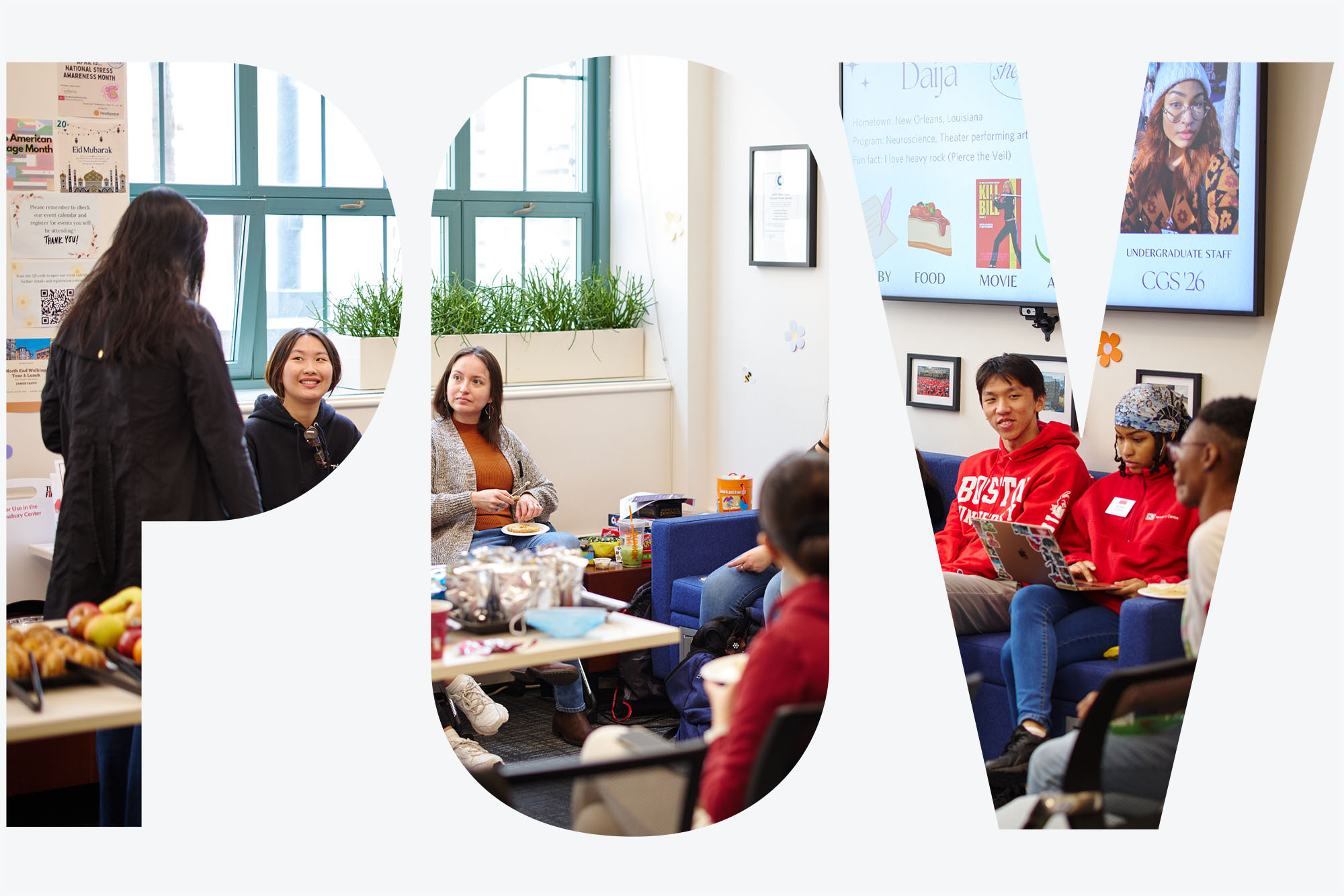POV: As We Observe First-Gen College Celebration Day, a Note of Thanks to BU’s Newbury Center

POV: As We Observe First-Gen College Celebration Day, a Note of Thanks to BU’s Newbury Center
Upon entering college, I frequently felt at a crossroads between helping my family survive and pursuing my degree—the center helped me “navigate and thrive”
At Boston University, first-gen students make up 19 percent of its undergraduate population, and current trends suggest this number will likely grow. Since 2019, first-gen applicants to higher education have increased at nearly twice the rate of continuing-gen applicants. But what many don’t realize is that once they arrive on a college campus, many first-gen students face ongoing, unexpected, and sometimes unknown barriers in higher education.
I know because I’m one of them.
I was born to immigrant parents and grew up in a small town in New Hampshire. My parents hoped for a better life in the United States, but financial instability prevented them from pursuing any formal education. As a result, I wanted to make my parents proud by becoming the first in my family to earn a bachelor’s degree. However, my family’s lack of experience in higher education meant that I was largely on my own throughout the entire search and application process.
Upon entering college, I frequently felt at a crossroads between helping my family survive and pursuing my degree. As I juggled academic and extracurricular demands, I also worked three part-time jobs to help my family. Yet I needed to tread carefully. If I worked too many hours, I felt that I risked having little time for my studies and possibly failing. But if I worked too little and didn’t earn enough money, my family risked eviction. As I tried to balance supporting my family and completing my studies, I ended up downplaying my first-gen identity.
Not only did I face immense pressure to succeed, but I also feared the idea of being seen by anyone as unprepared for college—an experience I thought was common to all students. Although I struggled to afford food and basic supplies like books, I refused to tell anyone. I avoided telling my friends about my core self and kept my struggles secret from my parents.
My perspective changed after reading a newsletter that BU was opening the Newbury Center. When BU announced the opening of the center in 2020, I initially questioned its necessity. Aren’t first-gen students all in the same boat as continuing-gen students? What makes my identity special? Regardless, I was curious about the new center and ended up writing down my email to get on their weekly mailing list. Little did I know that this email sign-up would help me navigate and thrive at BU.
Because the Newbury Center tailored its mailing list to first-gen students like me, I could easily sift through the mountain of events, programs, internship and job listings, and countless other opportunities available at BU. No longer did I feel overwhelmed, because now a centralized list helped me learn about the University’s resources in just a few clicks. Through the Newbury Center, I discovered undergraduate research opportunities, resources for my food and financial insecurities, funding for unpaid internships, first-gen-specific events or programs, and so much more.
The center also raised awareness of the challenges that other first-gen students faced and helped me realize that having three jobs just to support my family and my education, struggling to afford basic supplies like books, and trying to figure out college all at once were anything but normal. I felt a better sense of community and belonging knowing that there were other students who held similar experiences and staff dedicated to helping us succeed.
Most important, the center helped me adapt to Boston’s skyrocketing cost of living. Every week, the center hosts First-Gen Fuel-Up Friday, offering me a free light breakfast and the chance to chat with other students. And at virtually every event I’ve attended—academic, professional, or social—the center has provided me with free snacks, lunches, or dinners. While food may seem minor to many, the costs add up. It made all the difference in ensuring I could continue supporting my family and funding my education.
The Newbury Center positions BU as a leader in higher education, serving as a role model that other colleges should follow. The center not only helps our first-gen students navigate and succeed at BU, it also strives to amplify our presence and voice through its annual Elevate magazine, the Tri-Alpha National Honor Society, and National First-Generation College Celebration Day, all of which bring hundreds of students and advocates together.
When I walk across the stage to receive my diploma at graduation this May, I’ll know that I was able to succeed in no small part because the Newbury Center was there to help me meet so many of the challenges that were before me. A recent study shows that first-gen students are four times less likely to graduate college than continuing-gen students. I can confidently say that I defied those odds.
Johnson Peow (CAS’24) is a first-generation college student majoring in history. He can be reached at jpeow@bu.edu.
“POV” is an opinion page that provides timely commentaries from students, faculty, and staff on a variety of issues: on-campus, local, state, national, or international. Anyone interested in submitting a piece, which should be about 700 words long, should contact John O’Rourke at orourkej@bu.edu. BU Today reserves the right to reject or edit submissions. The views expressed are solely those of the author and are not intended to represent the views of Boston University.
Comments & Discussion
Boston University moderates comments to facilitate an informed, substantive, civil conversation. Abusive, profane, self-promotional, misleading, incoherent or off-topic comments will be rejected. Moderators are staffed during regular business hours (EST) and can only accept comments written in English. Statistics or facts must include a citation or a link to the citation.